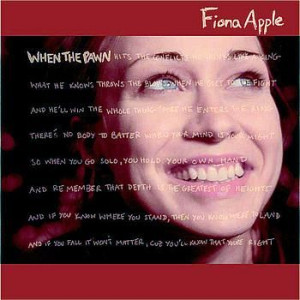 Kate Danemark wrote this review.
Kate Danemark wrote this review.
I have had one truly great love affair in my life, and this was its soundtrack. For those of you who know pianist and lyricist Fiona Apple from her previous album Tidal (1996), you can guess what that statement indicates. For the others, unfortunate enough to have overlooked Apple thus far, I’ll tell you, this is not a good thing. If ever Apple has had a nice relationship that ended in an amicable parting, there’s no sign of it in her music. She could have invented the statement “love hurts.”
Oddly, this does not detract from her appeal. Although she tends to focus on the one topic exclusively, she does it so well, and so inventively from song to song, that I am able to play the CD repeatedly and never grow tired of hearing the clever lyrics and her powerful, sultry voice.
Apple can go from slow and moody songs, such as “I Know,” a lyrical rumination on waiting in the wings for love, to the unusual arrhythmic drumbeat and piano on “Limp,” one of the harshest chastisements I’ve ever heard.
In “Paper Bag,” Apple uses her lilting voice and vocal range to great effect, trilling her way through extended lyrical acrobatics. Always, even despite the talent she exhibits on piano, and though there may be drums and other instruments to back her, the words are what hold my interest most, even through the consistent playing in the four years since I first heard this album. This song has one line that for me has always summed it all up. Through yet another doomed relationship, Apple says she’s “Looking for a little hope.” Unfortunately, “Baby said he couldn’t stay / wouldn’t put his lips to mine / and a fail to kiss is a fail to cope.” That’s it, in my opinion. When your lover can no longer reassure you with a simple kiss, it’s time to walk, baby. There’s nothing left there.
Absolutely my favorite song on this album is “Fast As You Can,” an amusing but soulful warning to all who might attempt to get too close. There’s a backbeat of pumping hard aggression to the fast pace with which the lyrics are thrown out at the listener, giving an overall feeling that clever words and self-deprecation are Apple’s most effective defense. Indeed, anyone faced with this observation: “Oh darling it’s so cute / you think you know how crazy / how crazy I am,” might do well to take heed. She follows this up with “You say you don’t spook easy / you won’t go / but I know / and I pray that you will.” I back her up in this hope, but can’t help noticing how many people feel exactly the same about themselves.
That, I think, is the best hook Apple has. She provides an absolute connection to what many feel at some point in their lives about themselves and their relationships. There is such a sense in today’s society that we are not whole enough, successful enough — or just not sane enough — to make a good partner to someone else. With self-help books flying off the bookstore shelves and mental health a booming business, we appear to be inherently flawed, incapable of the most rudimentary relationships necessary for the carrying on of the species.
Or maybe it’s just that we’ve lost our collective sense of humor about the whole thing, and our will to speak out and say what needs to be said. And that’s what I love so much about Apple. She says it, and she does it more perceptively, more honestly, and with far more clever irony than I have the talent or guts to do.
Apple has garnered many awards for her music, including a Grammy for “Criminal” (from Tidal) and several MTV Video Music Awards. Both When the Pawn and Tidal are platinum sellers.
Drummer Matt Chamberlain, keyboardist Patrick Warren and several other musicians back up Apple with woodwinds, bass guitar, and percussion on this recording. Producer Jon Brion chips in his varied musical abilities as well, as he did previously on Tidal.
There just isn’t a bad song on the album, and those not mentioned here have been left out for the purpose of brevity (which I’ve not managed to accomplish anyway!).
While my relationship may have been doomed, at least I had Fiona Apple to console me and be my voice for what emotions I had no words to express. In the end, this music, a few good books and great quantities of herbal tea were all I really needed to heal.
(Clean Slate/Epic, 1999)
